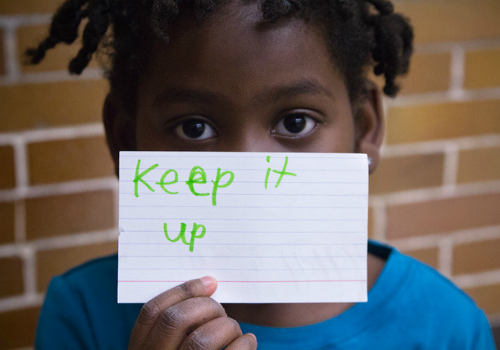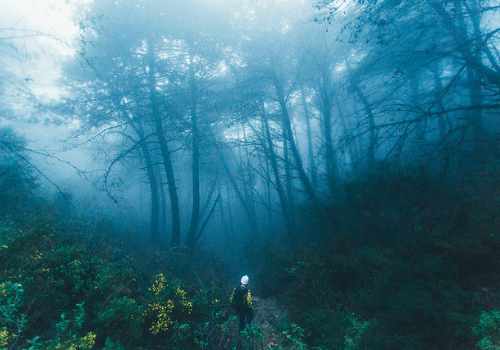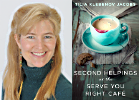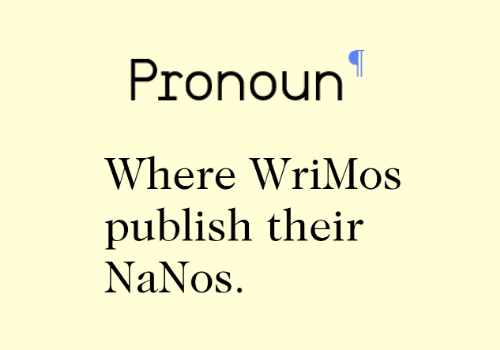Chris Baty's Blog, page 160
August 26, 2015
I Spy with My Critical Eye: Slaying Your First Draft Dragons

Writing a first draft requires a unique set of skills. All month, we’re asking authors to look back on their past first drafts… and the lessons they’ve learned from them. Today, Sarah Ockler, author of The Summer of Chasing Mermaids , shares how to slay your first draft:
There’s nothing quite like the euphoric haze of a new story idea. You know, the idea that keeps you up at night, that seeps into your dreams, that has you stopping in the middle of work or laundry or class to jot down a few notes. But once you decide to turn that idea into an actual novel, the real work begins: the first draft.
First drafts are tricksy. Writing them is a bit like encountering a sleeping dragon: one minute you’re discovering golden treasure, the next you’re getting flame-broiled by a mythical beast…
First Draft ChallengesAfter writing six (and a half!) novels, I’ve learned to spot some of my own common first draft dragons, as well as some tricks and techniques for keeping them at bay.
Problem: The dreaded blank page.
Solution: Pre-planning and creative visualization.
Some days the writing flows like a dream, while others, I find myself meandering all over the page, or just staring at the wall trying to figure out what to write. While this can be a fun way to discover new ideas, it’s not very efficient!
Whether you’re a plotter or a pantser, you can keep your writing day on track by spending a few minutes at the beginning of your session doing some creative visualization: close your eyes and picture a scene or chapter, letting it play out in your imagination like a movie. After you’ve got a clear idea, open your eyes and jot down a few bullet points from your vision.
Then, you’ve got your assignment—maybe even a mini-outline—and don’t need to break your writing flow to figure out what’s supposed to happen from one sentence or paragraph to the next.
Problem: Stifling creativity by over-planning.
Solution: Give yourself permission to wander and experiment.
While planning can help you avoid those wasted writing days, too much of a good thing can stifle creativity. If you’ve done extensive plotting and outlining, you may feel obligated to stick to the plan precisely, avoiding any deviations that might otherwise lead to brilliant discoveries.
No matter how extensively you plan, remember to leave yourself room to explore. Think of it like a road trip—you might start out with a map and an itinerary, but then a beautiful backcountry road appears before you. Take it! Who knows where it might lead? If it turns out to be a dead end, you can always go back to your map. So, stay open to new inspirations, even if they don’t yet fit in with your master plan.
Problem: Research wormholes.
Solution: Dedicated research hours separate from writing time.
We all know that the internet is a fountain of cool information. But when your writing day comes to a screeching halt just so you can look up the exact kind of tires your main character’s classic car should have, and six hours later you know everything there is to know about Henry Ford and the history of automobile production, you’ve slipped into a research wormhole.
If you reach a point in your draft where you need to look something up, make a note in the manuscript. The letters TBD (to be determined) are your friends! After you’ve finished your draft, set aside some dedicated time to go back and research all those cool little factoids, and then fill in the blanks.
Writing for youI wrote my very first novel rough draft over a decade ago, and now I’m on book number 7. While my process has gotten more efficient, there’s one thing I do miss about the first time: writing for myself.
Back then, writing was a purely creative process for me; I simply wrote the book that I wanted to read. Since then, I’ve been blessed with many readers, and I’m so grateful to be able to make my living as a novelist. However, I’m no longer writing just for me. There are a lot of voices in my head these days: readers and fans, critical reviewers, agents and editors, librarians, other authors, friends and family. Keeping them quiet is a challenge; sometimes those voices threaten to drown out my own.
Always write for yourself first and foremost. Stay true to your creative vision. No matter how challenging that first draft feels, remember the joy or creative spark that brought you to the page, and write from there. I’m still learning how to do this! ☺
Believe in your magicLike dragons, the act of writing a novel is nothing short of magic. You, as its creator, are pulling characters out of the ether and giving them life in a world of your own making. You’ve already been inspired, otherwise you wouldn’t be here, reading this. So now its time to honor that inspiration—let the muse know that you’ve heard her loud and clear, and show her that you intend to do something about it—by moving past fears and doubts, slaying your dragons, and getting those first words out on the page.
Trust your magic, writers. You’ve got this!

Sarah Ockler is the bestselling author of The Summer of Chasing Mermaids, #scandal, The Book of Broken Hearts, Bittersweet, Fixing Delilah, and Twenty Boy Summer. Her books have been translated into several languages and have received numerous accolades, including ALA’s Best Fiction for Young Adults, Girls’ Life Top 100 Must Reads, Indie Next List, and nominations for YALSA Teens’ Top Ten and NPR’s Top 100 Teen Books. She lives in the U.S. Pacific Northwest.
Top photo by Flickr user danna.
August 24, 2015
What I Learned at Camp: How to Help My Friends Be Extraordinary

Every new writing project is a chance to tell a new story… and to learn something about yourself. We’ve asked writers to share what they learned about their writing during Camp NaNoWriMo. Today, participant L. B. Zumpshon talks about the real purpose of NaNoWriMo:
Dear Writers,
I must confess: I haven’t been a good Camper. While I’ve won NaNoWriMo every time, I’ve never reached the word count I set for myself during Camp. For whatever reason, I take Camp NaNo a lot less serious than its big sibling. And so I ‘fail’.
What’s made things even worse this year is that I had to move away from my amazing real-life NaNoWriMo community. We met up every week if possible throughout the year, never judged each other’s word counts, and talked about lots of obscure, geeky writer-ly stuff. Having these people around inspired me to keep writing. While the NaNo forums provide the same support and pressure during November (and I am still in touch with friends from my former region), it’s been much harder to keep myself motivated to write for the rest of the year…
The best thing about Camp is that you get to set your own goals, and write/edit/create in whatever format you most desire. Yes, there are plenty of rebels during November, but they’re off in their own section of the website, so unless you have some rebels in your local group, everything is very much about the 50K. The fact that I could write a script is something I’m very glad I did but would never have done during November. Likewise, I am currently trying to write at least 500 words a day throughout the year. Camp adds a small incentive to do this during Camping months, but it doesn’t have the nice chunky impact of a 50K word count. And that’s okay.
The real goal of Camp, in my mind, is to keep writing throughout the year, to form a habit that lasts beyond just April, July, and November. As long as you write (or edit) something, get your creative juices flowing, then there’s no such thing as failing at Camp. Just like at a real camp, it’s not important whose kayak is the fastest or who gets the most perfectly melted marshmallow (can you tell I’ve never been to an actual camp?), but that you participate, make some new friends, learn something new about yourself and your writing, and have fun.
So, for anyone who’s finding it hard to motivate themselves to write, and maybe missing the support of real-life writing friends, you’re not alone. Let’s make a pact: I cheer you on, and you send some cheer my way, okay? One word at a time, we’ll help each other do something extraordinary.
Wishing you the word count of your dreams,
L.B. Zumpshon

L.B. Zumpshon is a cognitive neuroscientist in the midst of reinventing herself as a writer and editor. If you’re at all interested in finding out if she succeeds, or want to read her random posts on writing and revision, you can find her at her blog and on Twitter.
Top photo by Flickr user GotCredit.
August 21, 2015
What I Learned at Camp: Traveling off the Planned-Out Path

Every new writing project is a chance to tell a new story… and to learn something about yourself. We’ve asked writers to share what they learned about their writing during Camp NaNoWriMo. Today, participant Katy Pool shares her Camp travels through swamps, around plot holes, and into the winner’s circle:
Dear fellow Wrimos,
This July was a chance for me to get back into the groove of writing—specifically, writing a first draft. I’d been toiling long and hard on a project for almost two years, and this summer I was finally ready to set it aside and dive into something fun and brand new!
I spent all of June brainstorming and plotting for this new novel, and by the time July began, I thought I knew my characters, their world, and their goals inside and out. Turns out I was dead wrong.
As soon as I sat down to actually begin writing, I realized how very little I had actually planned out. It was like all of June I was drawing this map to get from Point A to Point B… and when I finally started on my trail, I found strange terrain, terrifying creatures, broken bridges, poisonous plants—you get the idea. But there was also unexpected beauty: sunrises and waterfalls, wildlife and ancient trees. Things I never would have been able to predict just from looking at my map.
There were definitely times when I had to stop, take a rest, and wonder where I was. Sometimes I consulted my map and tried to get back on track, and other times I kept going, trusting that my intuition and natural sense of direction would get me through.
My work in July was far from perfect… and I still have a lot left to do. But even if this turns into the worst first draft I’ve ever written (and it is starting to feel that way!) it will have been worth it for those moments of unexpected beauty. The moments that, ultimately, keep me going: thinking that just around the next bend could be a snappy line of dialogue, a perfectly worded description, or a line that gives me new insight into my characters.
Yes, a lot of days I felt like I was wading through a swamp or edging around a deep plot hole, but no matter what comes of this project, I have learned a lot from the journey. And that is what Camp is really all about: gaining new experiences, learning new skills, and, hopefully, finding something worth writing home about.
With love,
Katy

Katy lives in Berkeley, California, where she writes code by day and novels by night. She loves all things science fiction and fantasy. Her appetite for books is matched only by her appetite for tacos. You can find what she’s reading on Goodreads, or check out her Tumblr.
Top photo by flickr user MontyAustin.
August 19, 2015
What I Learned at Camp: Do You Do Better Under Pressure?

Every new writing project is a chance to tell a new story… and to learn something about yourself. We’ve asked writers to share what they learned about their writing during Camp NaNoWriMo. Today, participant Juliana Xavier talks about how she’s learned what motivates her to write… and what doesn’t:
Dear Wrimos of the World,
If you’re anything like me, you’re probably looking back at July’s Camp session and thinking, “What the hell happened?” Everything was going smoothly, until something came along and distracted you to the point of not finishing your story. So what’s up with that?
For the past three years I’ve been trying to write during Camp NaNoWriMo, but I’ve only managed to reach my goal once. That’s a huge contrast to all the years I’ve done November’s version, in which I’ve won every year. It’s kind of weird if you think about it since in a lot of ways, November’s version is way tougher than Camp. Being able to set your own word-count goal and have other people to discuss things with in your own personal virtual cabin should make the month go off without a hitch. But that doesn’t seem to be the case…
While taking part in those nifty cabins, it was interesting to see that other Campers mirrored my own actions. We’d all start out with such high spirits, posting things and replying to comments often, excited for what was to come. Once the month started, most people would fall into silence. By the end of the second week, most of us would start readjusting word-count goals to smaller numbers. Still, we were getting things done. Not at the pace we wished, of course, but it was amazing to see people getting some writing done despite all the odds being stacked against them.
Out of the twelve people in our cabin, only one person won. One of my fellow Campers even went as far as to apologize to our Cabin for not reaching their goal. That took me by surprise! Maybe they didn’t finish but they did something. We should all be proud of ourselves for trying. Besides, the year is not over yet!
And that’s when it hit me.
Every single time I’ve attempted to do Camp (and failed), it has served a greater purpose. It makes me feel like I’m running out of time. That feeling actually pumps me up even more! November feels like it’s do-or-die time. The other months? Not so much. Some of us do better under pressure, that’s never been a secret. But figuring out what types of pressure are healthy work-inducers? Now there’s a real challenge.
I can see that I’m beginning to unlock the mysteries of what might help me finish Camp sessions triumphantly. But I’m glad I learned that these “missed opportunities” aren’t really missed at all. In the future I’ll try little things, like setting up more challenges and maybe even a reward system.
Till then, there’s always November ready to kick my butt into shape. I’m looking forward to it.
With Love,
Juliana

Juliana Xavier hails from São Paulo, Brazil. She’s a writer, illustrator and has a BFA in Sequential Arts from SCAD University. She loves drawing all things cute. Storytelling is her raison d'etre (and that sure explains a lot). She h ates coffee (gasp!) but thinks that Thai bubble tea makes everything right with the world. You can find her on Twitter, Instagram, and Tumblr.
Top photo by Flickr user stevendepolo.
August 17, 2015
What I Learned at Camp: 3 Things to Pack to Prevent Stalling Out

Every new writing project is a chance to tell a new story… and to learn something about yourself. We’ve asked writers to share what they learned about their writing during Camp NaNoWriMo. Today, participant Holly S. talks about what she learned from hitting snags in her novel draft:
Dear fellow Wrimos,
What lovely weather we had for Camp NaNoWriMo this past July! The sunshine was ideal for hiking, building awesome sand castles (beachside Hogwarts, anyone?), and writing outside, of course! There’s nothing like some fresh air to get those fingers typing or pencils flying, especially when embarking on such a challenging writing journey.
Even though I wrote from the solitary comfort of my back porch, I certainly was not alone. Chatting with cabin mates and participating in Twitter sprints helped me feel as connected to other Campers as I felt to the outdoors surrounding me. The realization that I had plenty of company on this long trek inspired me to give it my all and added a boost of fun into the mix. Whenever I needed a break from tapping away on my keyboard, I knew I could turn to you all, my fellow Wrimos, for support…
Unfortunately, I hit a snag along my writing trail in the middle of the second week. All of a sudden, I got this overwhelming feeling that I had lost my way. Where was my plot going? I looked at the story map I had created while preparing for Camp, but it no longer looked like a viable road upon which my characters could travel. I’m big on planning, so you can imagine the terror I felt while writing a novel without a concrete idea of where it was going. I was so frightened, friends! Who knew what lurked around the next corner? A bear? An evil alien? Something worse?
I’m not going to lie: I was paralyzed by fear. After that second week, I did manage to write a bit more, but I was not able to reach my overall word-count goal. In future NaNoWriMo events, I need to tell myself to go with the flow. Sometimes it’s better to seek an alternate route when an obstacle occurs rather than forcing yourself to try to overcome it. This is a rough draft we’re writing here—it doesn’t have to be perfect! The next time I write in an event like Camp NaNoWriMo, I’ll remember to pack three more things in my backpack: flexibility, an open mind, and my “go with the flow” mantra.
I believe that there’s a lesson behind every failure, and my experience with Camp is no exception. But if failure creates opportunities to learn and grow… then is it really such a bad thing?
Thanks for embracing your outdoorsy sides with me this July, fellow Wrimos! See you all on our next great adventure!
With love,
Holly

Holly is a bookish, nut-allergic girl with a a passion for all things nerdy, wordy, and quirky. By day she is a library page, college student, and avid tea drinker. By night she’s a guacamole-fueled reader, blogger, and aspiring writer! Check out her blog, Nut Free Nerd, for more bookish and nerdy fun! You can also chat with her on Twitter and become her friend on Goodreads!
Top photo by Flickr user Leo Hidalgo.
August 14, 2015
What I Learned at Camp: The Importance of Corralling One’s Plot Bunnies

Every new writing project is a chance to tell a new story… and to learn something about yourself. We’ve asked writers to share what they learned about their writing during Camp NaNoWriMo. Today, participant Edeline Wrigh discovers just how many rough drafts are too many:
Dear fellow Wrimos,
I began Camp NaNoWriMo the same way I begin all writing challenges: by declaring myself a rebel, listing out all of the projects I had been working on or had been wanting to work on, and setting goals for each one. This approach does two things:
it ensures I have no chance of “winning,” but, it makes me get a lot done.I’ve created this plan for the very simple reason that I’m very, very bad at focusing my creative energy on one thing. While I have no problem distributing my word count among 15 projects, meeting a high word count on one is near impossible for me. The only time I won NaNoWriMo, I spent half the time procrastinating with school work…
Now that I’ve finished two-and-a-half novel manuscripts, a second iteration of a game, polished a long comic script (but only drawn two pages of it), and have bits and pieces of roughly a million other projects, I am forced to reflect on my creative decisions. The hard truth of the matter is that I love new ideas right up until they become work.
I’m not sure I’d approach my Camp or NaNoWriMo experience differently; it’s certainly helping me get those rough drafts done and ideas on paper. But it might be good for my art, and for me, to develop better post-event habits—that is, learning to focus just enough to actually edit.
Fact is, it’s completely fine to write first drafts as a hobby. Or to write first drafts until you fall madly in love with one.But if you’re like me—wanting to share the product of your love, sweat, and tears with others—you might want to hone your editing skills before then. That way, you’re already hardened to how others might critique your work.
Personally, I’m not good at this yet. But that’s why I’m going to be spending an hour a day minimum up until November practicing revision. All of those story ideas I threw away to pump out my first drafts have to become relevant again sometime, right?
That’s the plan, anyway. Even as I say this, the plot bunnies are running around in the back of my head—may you be better at keeping them penned up than I am.
With love,
Edeline Wrigh

Edeline Wrigh is a writer, artist, and game developer who informally researches the impact of stories and creativity on people and cultures. That’s what she claims, anyway, though she actually spends a lot of time on Twitter and devising new ways to claim playing video games is “productive.” When she’s behaving, she dresses like a fairy and makes things on Twitch or posts updates on her blog.
August 12, 2015
What I Learned at Camp: How to Plan for Persistence

Every new writing project is a chance to tell a new story… and to learn something about yourself. We’ve asked writers to share what they learned about their writing during Camp NaNoWriMo. Today, participant T. M. Spencer shares what she’s learned about planning and persistence:
Dear fellow Wrimos,
This past Camp NaNoWriMo was probably my worst one yet. In fact, I haven’t won a Camp NaNoWriMo event since my very first one in April 2014. Back then I wasn’t even with the 21st century and was writing by hand. Still, I’ve had great fun with each and every Camp since, even though I haven’t won any of them.
This one was no different, but July brought a few problems that I had no control over. Normally I would get up, stick the kettle on to boil and sit down to write. This has been my tactic for dealing with any NaNo. I tend to hole up in my house, in my Harry Potter pyjamas and just type until I’m hungry or in desperate need of more tea! (I can’t do very much at all without tea, in all honesty. How British of me!) I’m very much a solitary writer; I’m an introvert so it tends to come with the territory…
As I said, July brought with it a few problems I had no control over, the biggest one being “The Summer Cold”. Towards the end of July, I was helping at my church’s Holiday Club. All was fine to begin with: until the day I woke up without my voice; by Thursday I was asleep all day, full of The Summer Cold. No more youth work for me that week! And no writing either, because I was just so tired. Add into all of that my responsibilities as a sub-editor for a music and arts website and there was very little time for any NaNo writing. I never did make it past 10,000 words, and I’d planned a reasonable 25,000 words by the end of Camp.
I have a plan—sort of—for The Big One in November, though. I’ll still have responsibilities elsewhere as I did this time around, but with some careful planning (and an attempt to avoid The Winter Cold) and many long nights it can be done, and done well. My advice for those of us that didn’t reach your word targets (myself included): Keep Writing.
So it didn’t work out this time, it doesn’t mean it won’t ever work. And you don’t have to limit yourselves to April, July and November. In fact, you shouldn’t limit yourself to anything. Only you can tell your story the way it’s supposed to be told. Break the rules. Break your rules. Do what you can when you can. The important thing to remember is not to give up, otherwise nobody will ever have the chance to read your story.
With love,
T. M. Spencer

T. M. Spencer lives in Glasgow, Scotland, but is originally from Norwich, England. She has participated in NaNo-related things since November 2013 when she signed up mere hours before November 1 on a whim, with no idea, no plan and no laptop! NaNoWriMo ‘14 was the first year T. M. was able to type, which was very exciting! Coincidentally, that was also the year she won.
Top photo from Word Cafe.
August 10, 2015
Why I May Never Write a First Draft on a Computer Again

Everyone’s writing experience is different. This month, we’ve asked past NaNo and Camp participants to write letters from the other side of their experience. Today, Courtney Montgomery, a former NaNoWriMo intern, shares the one simple change she made that helped her finally complete a first draft:
NaNoWriMo is about throwing words at the world, regardless of sense or reason. It’s about liberating oneself from quality or the pressure to create “perfect” works of prose. It’s learning how to abandon the Inner Editor and plunge headfirst into the act of writing.
And I felt incapable of doing any of that. I may never write a rough draft on a computer again.
Rough drafts are delicate creatures, fragile and easily spooked. Yet even knowing this, I could never leave them alone during the actual writing process. Editing should be reserved for a completed draft, but I would needle and pick until my drafts-in-progress became nothing more than patchwork caricatures of themselves. My poor drafts and I could never move forward and I would eventually abandon them for greener pastures (all the while thinking I must be the worst writer to have ever lived).
But this year? This year, I decided to write my story by hand. I was going to write it linearly from beginning to end (exceptions being whenever I felt like defying that rule, which was often and with great enthusiasm) and I was not going to edit or erase. I was just going to keep going.
That was the key: no edits, no erasing, no second-guessing. Main character’s personality completely changed? Keep going! Forgot to introduce the villain four chapters ago? No matter! Make a note of it and keep going.
All throughout my month of writing, I carried my little noveling notebook with me. It followed me wherever I went, like a cheerful familiar or dark specter hanging overhead (depending on the day). Any time I had five minutes to spare, I made myself write a sentence. Any time I had a bolt of inspiration, my notebook was there to catch it before it slipped, ephemeral, through my fingers.
My noveling notebook came with me when I went out in the world and from room to room when I stayed inside. My novel came with me to work for lunch breaks. It came with me to bed. And, when I didn’t feel like writing, it was there to hang heavy in my periphery and force me to write another fifty words anyway.
Drafts two and three and seven and twenty I will type. Those drafts will live and breathe in my computer and on the cloud and wherever else novels should be stored for maximum redundancy. But I am achingly grateful to my Past-Self for deciding to write this year’s first draft by hand and keep every piece of it in the same notebook. Because different scraps of paper get lost and words on a screen are too easy to erase.
NaNoWriMo is for you. It’s for all of us. Whatever tools you use, whatever methodology works for you is amazing. Voice record your novel, type it, paint it, handwrite it—do whatever it takes to tell your story. For me, I think I’ll stick to pen and paper. But however you create, know that the world is better for having your story in it.
Top photo by Flickr user EcoVirtual.
August 7, 2015
Getting In

Today, Tilia Klebenov Jacobs, longtime NaNoWriMo participant and educator, as well as author of Second Helpings at the Serve You Right Cafe , shares her experiences helping her students in prisons write novels with NaNoWriMo:
I hope I never get so cynical that my heart fails to break a bit when one of my inmate students tells me he’s taking my class to learn to write better letters to his nine-year-old son.
I teach writing to inmates in several prisons: one women’s pre-release center, plus one medium-security and one maximum-security facility, both men’s. Entry procedures are different at every location. The prerelease center is easy.
The officer at the desk says, “Do you have a cell phone or other electronic equipment?” When I say no, he or she nods and I head to my classroom.
Sometimes they shake it up a bit. “Do you have a weapon or cuff keys?”
“Cuff keys?” I squawked. “Why would I have cuff keys?”
The women’s stories tend to be autobiographical, enough that it’s often hard to get them to change their protagonist’s name from their own.
By contrast, getting into a medium-security prison isn’t medium.
The first part feels a lot like an airport: put shoes and belt in a blue plastic box. Hand over driver’s license, sign in, write “No” in the box that says, “Have you ever been convicted of a felony?” Get a volunteer tag on a lanyard; walk through the metal detector (that clearly hates me, because even though I’ve left all my jewelry at home and I’m not allowed to have a clip in my hair and I don’t wear a bra with an underwire, the damn thing beeps anyway).
I step into a windowless room with a female Corrections Officer. She turns on a tape recorder and says her name and the date and states that the search will be conducted according to DOC rules. I say my name; I sign off on the search in a notebook. Then I turn around and raise my arms for a pat-down. I lift my hair so she can see the back of my neck. I pull my bra away from my body and no drugs drop out. I run my fingers around the waistband of my slacks. I lift my pants to the knee and roll my socks down to the toe. I open my mouth to reveal no pills, packages, or teensy metal devices.
And even though I know perfectly well that I’m not smuggling anything in, that even if I carelessly left some cash or a binder clip in my pocket the worst I would get is an eye roll and instructions to take it back to my car, my stomach yanks and I twitch all over. So I try to keep my visible jitters to a minimum, thinking, if you have to jiggle something, make it your toe.
Back in the hallway, the CO stamps my hand with invisible ink. They have several designs, and they rotate them. When I leave I’ll put my hand under a black light and they’ll check it. This is apparently so I can’t switch places with my incarcerated identical twin, who is a man.
I stand back from a steel door. It rolls open and lets me into a locked, chain-link enclosure topped with coils of glittering razor wire. This place is called “the trap.” It fits.
Another CO unlocks the door, and I walk across a paved yard into a low, boxy brick building with classrooms on the second floor.
I’m finally in.
The classroom has linoleum floors and a chalkboard and a jumble of battered, mismatched chairs with desktops attached. It’s very ordinary, except for the fact that the door is always propped open and windows overlook the hallway. With COs strolling the hallway at unscheduled intervals, we are under constant possible scrutiny. It’s a reminder that no matter how many confidences we exchange in class, no matter the warm and fuzzy feelings we generate, these guys didn’t get here by accident.
The men write more out-and-out fiction, partly because they’re men and partly because what they’ve done is generally far more, um, colorful than what the women did. Once an administrator explicitly told a particular con not to share the story of his life with me, or at least not to exceed PG-13.
They love fantasy, creating eight-year-old dragon riders and mysterious funerals and dark future worlds where sunlight is at a premium. Writing is an escape. One man told me my course gave him and his fellows “a respite from despair.”
And that, ultimately, is why I keep going back. I help my incarcerated students string their words together and make them their own, so that their stories—and voices—soar. Writing provides an escape to men and women who know little other freedom.

Tilia Klebenov Jacobs is a graduate of Oberlin College and Harvard Divinity School, and is the author of Second Helpings at the Serve You Right Cafe. She has taught middle school, high school, and college; currently she teaches writing to inmates, and is a judge in the Soul-Making Keats Literary Competition in San Francisco. Her fiction and nonfiction have been published to critical acclaim. Tilia lives near Boston with her husband, two children, and two standard poodles.
Top photo by Flickr user c_l_b.
August 5, 2015
Why I won’t let the “Big Five” publish my next book

Every year, we’re lucky to have great sponsors for our nonprofit events. Pronoun, a 2015 Camp NaNoWriMo sponsor, asked author Christina Bryza to share her publishing experiences… and what she’s learned from them:
August has barely begun, yet my eyes are on November: I’m determined to finish (and maybe restart) the book I’ve been playing with during April and July at camp.
And when it’s done? Of course I want to publish, but the question is: how?
I worked at Simon & Schuster for nearly a decade, where I was a published author as well as an employee. I had the unique opportunity to experience all aspects of traditional publishing, and while I collaborated with a bevy of good people, I didn’t ultimately get a good deal…
I’ll always be grateful for the deal I got, however, because it taught me a ton about what authors need and want. Before I published, I understood that authors considered their books their babies, but inside the company we saw them as products. I didn’t know how vulnerable it feels to put your heart’s work in the hands of someone else.
Now I know. And sentiment aside, it’s a problem that my metadata (description, bio, search terms, price) is in someone else’s hands. It’s a problem that my rights to my work are no longer mine. It’s a problem that while my financial stake in my book is low (I receive less than ten percent of each sale), my emotional stake is higher than anyone else’s.
My book is indeed a product, but I also love it dearly. And because I published traditionally, I’m relatively powerless to help it succeed. I can’t lower the price or change my book description; I can’t send out the ebook for free to reviewers or optimize my keywords for SEO.
I’m still committed to publishing professionally, but for my next book I’m using a free platform that lets me keep 100% control of my rights and my earnings, and uses technology and data to help me market and sell. I’m not looking for a book contract or backing from the Big Five. Been there, done that. I’m publishing on Pronoun.
A week after I learned Pronoun existed, I quit my job at Simon & Schuster. That’s how excited I was to take part in a new kind of publishing, a kind that empowers the author above anyone else.
Yes, I love Pronoun because I work there. But I work there because I’m an author who deeply values books and the people who create them. I’m grateful I get to help create a new pathway for writers to succeed, and I can’t wait to be “Pronoun published.”

Christina Bryza is the author of
Are You My Boyfriend?
and the Director of Author Advocacy & Marketing at Pronoun, a digital publishing platform for authors. She’s been a Wrimo since 2007 (so far she’s won with a novel, a memoir, and a short story collection) and is eager to publish her newest book in a new way.
Chris Baty's Blog
- Chris Baty's profile
- 63 followers



